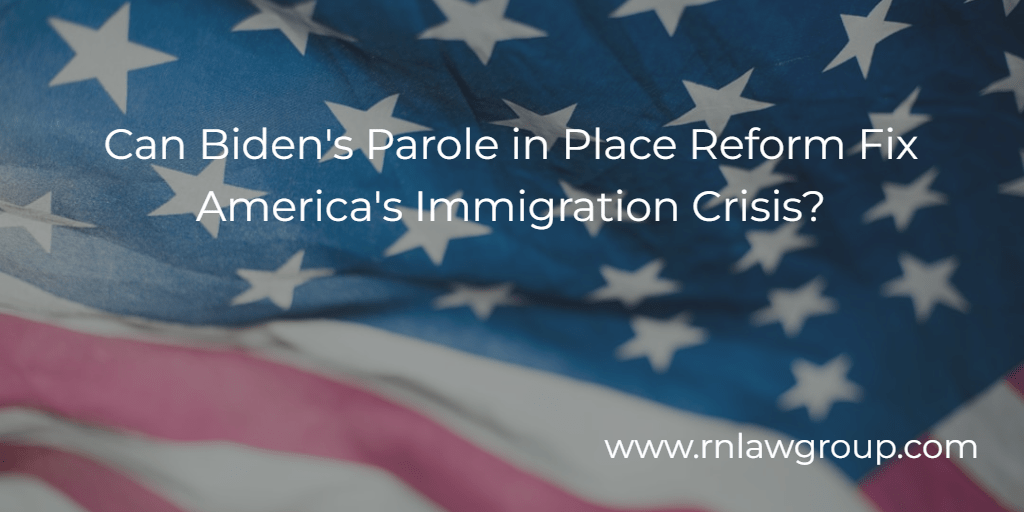
Can Biden’s Parole in Place Reform Fix America’s Immigration Crisis?
In a significant move aimed at overcoming congressional inaction on immigration reform, the Biden Administration has announced a new process allowing certain undocumented spouses of U.S. citizens and their undocumented children to apply for Parole in Place (PIP). This initiative comes 12 years after the Obama Administration’s introduction of the Deferred Action for Childhood Arrivals (DACA) program, marking a continued effort to provide relief and stability to undocumented individuals living in the United States. The new PIP process would protect applicants from deportation and allow the ability to obtain work authorization through an Employment Authorization Document (EAD) card, and can ultimately provide a pathway to permanent residence.
Legal Framework Supporting Parole in Place
Section 212(d)(5)(A) of the Immigration and Nationality Act (INA)
Section 212(d)(5)(A) of the Immigration and Nationality Act (INA) provides that “[t]he Attorney General may … in his discretion parole into the United States temporarily under such conditions as he may prescribe only on a case-by-case basis for urgent humanitarian reasons or significant public benefit any alien applying for admission to the United States.” This provision allows for the discretionary parole of individuals who might otherwise be inadmissible, providing a legal mechanism for granting temporary relief and work authorization to undocumented family members of U.S. citizens.
Adjustment of Status Under INA § 245(a)
Furthermore, INA § 245(a) states that “[t]he status of an alien who was inspected and admitted or paroled into the United States … may be adjusted by the Attorney General, in his discretion and under such regulations as he may prescribe, to that of an alien lawfully admitted for permanent residence if (1) the alien makes an application for such adjustment, (2) the alien is eligible to receive an immigrant visa and is admissible to the United States for permanent residence, and (3) an immigrant visa is immediately available to him at the time his application is filed.”
For spouses of U.S. citizens, an immigrant visa is always immediately available, and there is no limit on the number of green cards that can be issued in this category each year. In addition, the typical grounds of inadmissibility that would make an individual ineligible to receive a green card do not apply to immediate relatives. What has prevented these individuals from receiving green cards until now is the requirement of being inspected and admitted or paroled, as most commonly they entered the United States without inspection. This parole in place removes this barrier, enabling eligible individuals to adjust their status and secure permanent residency.
Concerns Over USCIS Capacity to Handle Increased Applications
Anticipated Influx of Applications
While the Biden Administration’s new PIP process represents a significant step forward for undocumented spouses of U.S. citizens and their children, it raises concerns about the ability of U.S. Citizenship and Immigration Services (USCIS) to manage the anticipated influx of applications. With an estimated 500,000 spouses and 50,000 children potentially eligible for this relief, questions arise about USCIS’s current capacity to handle such a substantial increase.
Existing Backlogs and Delays
Already struggling with backlogs and delays in processing existing applications, USCIS faces the challenge of allocating sufficient resources and personnel to ensure timely adjudication of these new PIP applications. This situation underscores the need for USCIS to enhance its operational efficiency and possibly seek additional funding or reforms to manage the increased workload effectively. Ensuring that the new initiative fulfills its promise without exacerbating existing delays will be crucial for the success of this policy.
Failure to Address Relief for Legal Immigrants and Documented Dreamers
Prolonged Waits for Green Cards
Despite the Biden Administration’s efforts to address certain immigration issues through the new PIP process, it has notably fallen short in providing relief for legal immigrants with approved I-140 petitions who face prolonged waits for green cards due to visa backlogs. These individuals, who have already demonstrated their eligibility and merit for permanent residency, continue to languish in an uncertain status, often for many years. The failure to address this issue leaves a significant number of immigrants in a state of limbo, unable to fully integrate into American society despite their contributions and qualifications.
The Plight of Documented Dreamers
Additionally, the administration has not addressed the plight of documented Dreamers—children of legal immigrants—who risk “aging out” of their dependent status upon turning 21, thereby losing their eligibility for derivative visas and facing potential deportation. This oversight leaves thousands of individuals and families in limbo, highlighting a significant gap in the administration’s approach to comprehensive immigration reform. Without specific measures to protect these young individuals, the immigration system continues to fail those who have followed the legal process but face bureaucratic hurdles.
Streamlining Employment-Based Visas for DACA Recipients and Graduates: DHS and State Department Collaboration
In addition, the Biden Administration intends to provide a way for some undocumented individuals to qualify for employment-based nonimmigrant visas. Deferred Action for Childhood Arrivals (DACA) recipients and undocumented noncitizens who have graduated from an accredited U.S. institution of higher education could qualify. What has prevented these individuals from receiving visas until now is the unlawful presence ground of inadmissibility. Under U.S. immigration law, an individual accrues unlawful presence if they remain in the United States without legal authorization. If an individual accumulates more than 180 days of unlawful presence and then departs the country, they become subject to a three-year bar on reentry. If the period of unlawful presence exceeds one year, the bar extends to ten years.
When an undocumented person applies for a visa at a U.S. consulate, the consular officer is required to review their immigration history. If the officer determines that the applicant has accrued unlawful presence and is subject to the three- or ten-year bar, the visa application will be denied. This legal framework effectively prevents many undocumented individuals from obtaining a visa, as their past unauthorized stay in the U.S. renders them inadmissible for a specified period. Overcoming this bar typically requires a waiver, which is difficult to obtain and is granted only under certain circumstances. Little detail was provided in today’s announcement, but it appears that the Biden Administration intends to provide a streamlined process for these individuals to receive a waiver and return to the United States in a valid nonimmigrant status. According to USCIS policy, the time an individual spends in the U.S. in a lawful nonimmigrant status after receiving a waiver can count towards satisfying the 10-year bar. Specifically, the individual is not accruing any additional unlawful presence during this period, and their lawful stay can be considered when assessing their eligibility for adjustment of status after the bar has been met. This allows them to eventually adjust their status to lawful permanent residence in employment-based categories, provided they meet all other eligibility requirements.
The Need for Comprehensive Immigration Reform by Congress
Real Reform is the Job of Congress
The PIP announcement further underscores the broader issue of Congress’s repeated failure to enact comprehensive immigration reform. Real reform is the responsibility of Congress, which holds the legislative power to create lasting and systemic changes to the immigration system. Despite numerous attempts over the years, Congress has consistently fallen short, leaving millions of immigrants in limbo and creating a patchwork of temporary solutions that do not address the root causes of the immigration crisis.
Reliance on Executive Actions
This inaction has led to a reliance on executive actions, which, while helpful, are often limited in scope and subject to change with each administration. Executive actions, such as the new PIP process, provide temporary relief but do not offer the permanence and stability that comprehensive legislative reform can achieve. The persistent failure of Congress to pass meaningful immigration legislation perpetuates uncertainty and instability for countless individuals and families.
Urgent Need for Bipartisan Effort
The urgent need for a bipartisan effort to achieve comprehensive and lasting reform cannot be overstated. Only through concerted legislative action can the systemic issues within the immigration system be addressed, providing a clear and fair path for all individuals seeking to build their lives in the United States. Comprehensive reform would address the needs of undocumented immigrants, legal immigrants with pending applications, and documented Dreamers, ensuring a more just and effective immigration system.
Conclusion
The Biden Administration’s new Parole in Place process marks a significant effort to provide relief to certain undocumented families, continuing the legacy of DACA in seeking stability and protection for undocumented individuals. However, the implementation of this process highlights the ongoing challenges faced by USCIS and the broader failures of Congress to enact comprehensive immigration reform. While executive actions can provide temporary solutions, real and lasting change requires legislative action. Congress must rise to the occasion and pass meaningful immigration reform to address the needs of all immigrants and ensure a fair and functional system for the future.
For over 25 years, Reddy Neumann Brown PC has focused solely on U.S. employment-based immigration, and works with employers to establish best practices when navigating the PERM labor certification process. If you are in need of a U.S. work visa or permanent residency, speak with one of our immigration lawyers. Please contact us online, call our Houston business immigration office directly at 713-953-7787 or schedule a consultation.
By: Emily Neumann
Emily Neumann is Managing Partner at Reddy Neumann Brown PC with over 15 years of experience practicing US immigration law providing services to U.S. businesses and multinational corporations. Emily has helped transform the firm from a solo practice to Houston’s largest immigration law firm focused exclusively on U.S. employment-based immigration. She received her Bachelor’s degree in Biology from Central Michigan University and her Juris Doctorate degree from the University of Houston Law Center. Emily is a frequent speaker and has been quoted in Forbes, Bloomberg Law, U.S. News & World Report, Inside Higher Ed, and The Times of India on various hot topics in immigration. She is a member of the American Immigration Lawyers Association and Society for Human Resource Management.

